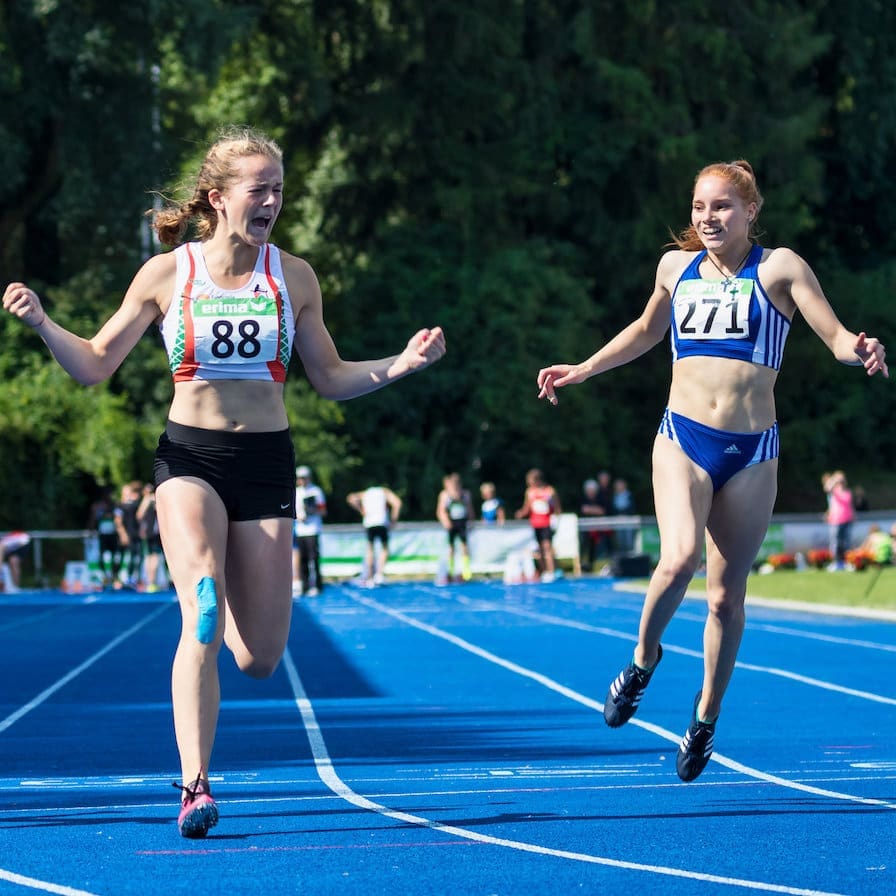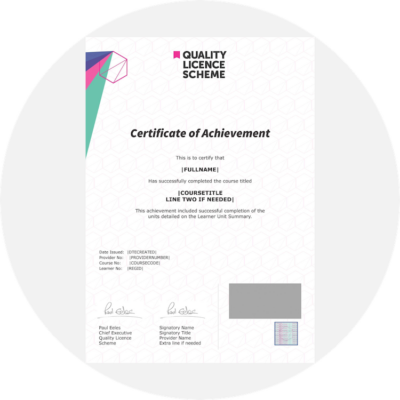
Awarding body:
Skills and Education Group
Study time:
12 months
Study method:
Online
£299.00
Psychology is what sets great athletes apart from others. Understanding this link is very important and our Sports Psychology Level 3 course is designed to cover what makes sportsmen and women tick in order to gain the competitive edge need to win.

Choose your enrolment options
About this Sports Psychology Level 3 Course
Sports Psychology is about getting into the head of sportspeople to be able to reduce issues and increase performance through psychological development. Understanding the power of the mind in performance is vital for many athletes to gain the edge needed to win in competition. Our Sports Psychology Level 3 course covers several units to enable you to fully understand the need for a strong mindset in sport.
| Study Time: | 100 hours |
| Enrolment length: | 12 months |
| Course Format: | Online |
| Entry Requirements: | None Specific |
Upon completion of this course students receive a Quality Licence Scheme certificate and an OLC Certificate. All certification fees are included in your course fees.
Certification
To complete this Sports Psychology Level 3 course you will need to submit, and pass, all of the tutor marked assignments. There are seven assignments in the course and no need to purchase any textbooks as we provide all of the lessons and materials required to learn the syllabus. All assignments are coursework based and are in an essay/question and answer style to test your knowledge of the topics covered in each of the course sections.
Course Content
This course assesses the following units:
Unit 1 – The role of the sports psychologist
It has become increasingly obvious that the way in which an athlete thinks is of great importance to the way in which they perform, and therefore the use of a sports psychologist helps the athlete to be mentally prepared as well as physically prepared. This unit will cover the work of a sports psychologist and the edge they can give to athletes.
This unit will teach you to:
- Understand the meaning of psychology
- Explain the role that ethics plays in psychology
- Identify the approaches used by sports psychologists
- Gain an awareness of the theories commonly referred to in psychology
Unit 2 – Research methods
In this unit you will learn about the different methods of research, consider who your participants will be and look at ways of collecting data. You will learn about qualitative and quantitative research methods and discover the different types of experiments that might be carried out such as laboratory, field and natural. Finally, you will look at the different ways of collecting data and consider the advantages and disadvantages of carrying out questionnaires, interviews and observations.
This unit will teach you to:
- Understand the importance of research in sports psychology
- Determine the best methods of research to use depending on the type of research you are carrying out
- Consider theories
- Understand the differences between qualitative and quantitative research methods
- Consider types of experiments such as laboratory, field and natural
- Look at how questionnaires, interviews and observations can be useful for research
Unit 3 – State of mind
You will explore the different types of anxiety and look at measuring levels. You will learn about factors that induce anxiety and stress such as situational and individual, and examine ways of reducing these conditions.
This unit will teach you to:
- Understand the definition of arousal and anxiety
- Explore the different types of stress
- Consider the factors which induce stress and anxiety
- Look at ways of measuring stress
- Explain the different types of imagery techniques
Unit 4 – Personal attributes and sports psychology
This unit will help you to identify the different social learning theories and encourage you to look at how personality impacts on a person’s attitude towards sport.
This unit will teach you to:
- Understand the main factors that influence the way in which an individual reacts
- Consider several theories of personality including Cattell and Bandura
- Gain an awareness of the structure of attitudes, how they are formed and measured and how they can be altered
Unit 5 – Aggression and sport
In this unit you will explore the different forms of aggression including hostile and instrumental aggression and gain an insight into how aggression affects performance. You will then look in detail at the theories of aggression before considering factors that can affect aggression and how aggression can be reduced.
This unit will teach you to:
- Understand the definition of aggression
- Understand the different forms of aggression
- Analyse how aggression affects performance
- Understand the theories of aggression
- Identify factors affecting aggression
- Look at ways of reducing aggression
Unit 6 – Motivation, mental health and recovery
This unit will teach you the importance of motivation in sports psychology and how each individual’s motivation will differ from others. You will explore motivation theories and look at the works of Maslow whereby he identified different levels of need. Finally, you will look at how burnout can be prevented and identify a path for recovery should an individual have suffered a burnout.
This unit will teach you to:
- Understand the meaning of motivation
- Research theories surrounding motivation including those of Maslow, McClelland-Atkinson and Attribution
- Consider different mental health difficulties associated with sport
- Understand the meaning of burnout
- Explore responses to stress and pressure due to burnout
- Identify ways to prevent burnout
- Identify ways an individual can recover
Unit 7 – Social influences and group dynamics
In this unit you will learn about the four stages of forming a team or group and look at the different roles within. You will explore the different styles of leadership and examine theories surrounding leadership before making the important connection between the relationship of coach and athlete.
This unit will teach you to:
- Identify the differences in groups and teams
- Understand the four stages of forming a group or a team
- Identify Belbin’s team roles
- Understand what is meant by group cohesion
- Explore different styles of leadership
- Consider the relationship between coach and athlete
This course can be taken over a 12 month period but you can complete it as fast or as slowly as you wish.
Online study and instant enrolment
All of our students are given access to our Online Campus through their own personal login and password. As soon as you complete your enrolment, you would have immediate access to your account which allows you to make a start working through the lessons. Tackle your assignments as your own pace and contact your tutor to access any help and support you need. The course itself is set out in a very simple layout, making it easy to work through the topics and complete your assessments.
Our Online Campus includes:
- Instant enrolment – access everything on your course from the moment you enrol.
- Personal account logins – login any time, 24/7.
- Full support throughout – message your tutor, use our online chat or give us a call.
- Online assignment submissions – upload work online from the comfort of home.
- Self-led learning – study at your own pace so you can pass much faster.
- Safe e-portfolio system – store all of your work in your account.
- Progression tracking – easily see what assignments you have left to complete.
- Details help centre – get instructions and guidance every step of the way.
- Unlimited attempts – submit as many attempts at your assignments as you need.
Unlimited assessment submissions
All of the assessments for this course are completed through our Online Campus. You can attempt each one as many times as needed to ensure you pass. After every attempt, your tutor will provide detailed feedback and tips on how you can improve going forward. Quickly see your progress during your studies by checking your progress bar and seeing the remaining assessments you need to complete.
Get full tutor support
Throughout your enrolment with the Online Learning College, you can access support at any time you need. All students are assigned a personal tutor who will mark all of your work and provide detailed feedback after every submission. Your tutor will be an industry expert with a full knowledge of the course content and will be able to help you at any point along your learning journey. One of the best tools at your disposal is your tutor – you can ask as many questions of them as you wish to and they will be happy to help at any time.
We also have a brilliant support team on hand and available through email, online chat and over the phone. This team is there to help with any questions which are more generic, such as providing support in submitting work through your account or getting your certificate when you have completed your course. We pride ourselves on ensuring the support you receive is the best in the business – help and guidance is fast and detailed every time you contact a member of the team.
Assessments
To pass this course learners must pass 7 assignments. These are completed after navigating through the corresponding lessons and writing your answers to assignment questions. Once these have been read and marked by your personal tutor, feedback and marks are provided to students which contain helpful tips to improve work in future assignments.
Enrolment Length
All of our courses are allocated plenty of time for students to complete their studies and all materials are self-led so that you can complete the course at your own pace, but you have access to the course on the Campus for 12 months from your enrollment date. Should you require additional time on one of our courses you can extend your enrolment by 30 days for an additional fee of £60. As well as this we operate a 14 day money back guarantee on every one of our qualifications- that’s how confident we are of how you will love studying with us!

Quality License Scheme Certification
At the end of this course, successful learners will be given the option to receive a Certificate of Achievement from the Quality Licence Scheme and a Learner Unit Summary (which lists the components the learner has completed as part of the course).
Quality License Scheme Certificate
All Certification Costs Included
Frequently Asked Questions
Learn more about this course and others that we offer. If you still have any questions, simply contact our course advisors on 0800 772 0887 or email info@ol-college.com.
What is included in this Sports Psychology Level 3 course?
All of our courses come with everything you need. Your lessons, tuition and certification costs with the Quality Licence Scheme are included in the cost of this course. There is nothing else that you need to buy or pay for in order to finish the course and get your certificate.
Is this course regulated?
At the end of this course successful learners will be given the option to receive a Certificate of Achievement from the Quality Licence Scheme and a Learner Unit Summary (which lists the components the learner has completed as part of the course).
The course has been endorsed under the Quality Licence Scheme. This means that Oakwood Home Learning has undergone an external quality check to ensure that the organisation and the courses it offers, meet defined quality criteria. The completion of this course alone does not lead to a regulated qualification* but may be used as evidence of knowledge and skills gained. The Learner Unit Summary may be used as evidence towards Recognition of Prior Learning if you wish to progress your studies in this subject. To this end the learning outcomes of the course have been benchmarked at the level shown against level descriptors published by Ofqual, to indicate the depth of study and level of demand/complexity involved in successful completion by the learner.
The course itself has been designed by Oakwood Home Learning to meet specific learners’ and/or employers’ requirements which cannot be satisfied through current regulated qualifications. The Quality Licence Scheme endorsement involves robust and rigorous quality audits by external auditors to ensure quality is continually met. A review of courses is carried out as part of the endorsement process.
The Quality Licence Scheme is part of the Skills and Education Group, a charitable organisation that unites education and skills-orientated organisations that share similar values and objectives. With more than 100 years of collective experience, the Skills and Education Group’s strategic partnerships create opportunities to inform, influence and represent the wider education and skills sector.
The Skills and Education Group also includes two nationally recognised awarding organisations; Skills and Education Group Awards and Skills and Education Group Access. Through our awarding organisations we have developed a reputation for providing high-quality qualifications and assessments for the education and skills sector. We are committed to helping employers, organisations and learners cultivate the relevant skills for learning, skills for employment, and skills for life.
Our knowledge and experience of working within the awarding sector enables us to work with training providers, through the Quality Licence Scheme, to help them develop high-quality courses and/or training programmes for the non-regulated market.
*Regulated qualification refers to those qualifications that are regulated by Ofqual / CCEA / Qualification Wales
Do I have to sit an exam?
No, there are no exams for this Sports Psychology Level 3 course. Everything is assessed through coursework and assignments which you can submit at anytime within the enrolment term.
Am I assigned a tutor for this Sports Psychology Level 3 course?
You are! Once you have enrolled then you will have an assigned tutor, this person is the one who will be marking your work, providing feedback, and passing your work. If you need to speak to your tutor at any time throughout your enrollment then you can message them via the campus and they will reply within 24 hours of out working hours.
Can I speak to someone before I enrol?
Of course! We have course advisors and a customer service team in the office Monday to Friday 9am until 5pm who will be happy to help and answer any questions that you may have. You can call us on 0800 772 0887, email us at info@ol-college.com or we even have a live chat facility.
How long do I have to study?
The enrolment term is 12 months, however, as long as you complete all of the written assignments and practical tasks (if applicable) then you can complete the course sooner if you wish. If you need any additional time after the 12 months then you can also extend which costs £60 per month and you can do this as many times as needed.
What are the payment options?
There are various payment options for this Sports Psychology Level 3 course. The first option will be for you to purchase the course and pay in full upon enrolment. The second option is the pay monthly option, this is completely interest free and splits the cost into 12 monthly payments. Finally, we can send an invoice with 30 days payment terms if your employer will be funding the cost of the course – if you would like this option, then please ask your employer to get in contact with us so we can provide them with the details we will need.
Do you offer any funding for the course?
Unfortunately we don’t offer any free or funded courses but you can split the cost into 12 monthly payments which is completely interest free.
Do I need to buy anything else for this Sports Psychology Level 3 course?
Everything that you will need will be provided to you when you enrol, you will also need to complete some of your own research too. Buying text books and other resources can become costly so we don’t ask you to or recommend buying anything, there is lots of free and very useful information online!
How do I see my course material/resources?
Everything that you will need for your course will be accessible on our online campus. You can select the online and paper versions of most of our courses too, if you select this option then there will be an additional £35 cost, this covers the cost of us printing out a full course pack in a ring binder folder and sending out via Royal Mail 1st Class, Tracked & Signed delivery.
How do I log in and access my course?
Once you have enrolled then you have access to the campus right away to get started on your course. You can log in by going to our website and clicking ‘Log in’ at the top right hand side of the page. Your username is the email address that you used to enrol and your password is the one you created at the checkout when enrolling.
When will I receive my certificate?
Once you have completed and passed all units and your course is paid in full (either paid in full upon enrolment or if paying monthly then the remaining balance paid or monthly payments complete), then we can request your certificate from the Awarding Body. Certificate’s take 6-12 weeks to arrive with us and once we receive it we will then contact you to confirm the address to post it to. Certificate’s are sent via Royal Mail 1st Class, Tracked & Signed delivery.
What happens if I fail an assignment?
If you fail an assignment, then please do not worry! You can resubmit your assignment as many times as needed until you pass. Each time you submit an assignment then your tutor will mark it and provide feedback, you can then make the amendments and resubmit and have the new version marked again.
How long does it take to mark my work?
We have a marking timescale of 5 working days from the submission, your tutor will mark your work and provide feedback with if you need to make any amendments to enable you to pass. Please note, we do ask that learners don’t upload more than one submission at a time as this will delay the marking not just for yourself but for other learners too.
Do I have to attend or view any live/virtual lessons?
You don’t, everything is in written, text, image and diagram format. You will have access to the campus 24/7 to be able to log in and complete your work. You won’t need to view any videos or audio lessons.
What device can I/shall I use?
As you will have assignments to write and type up for submission then we would recommend using a computer or laptop for this as you will need to use a software such as Microsoft Word or Google Docs to type these. You may also be able to use an iPad/tablet for this. You can use a smartphone if you wish but you may find it difficult and it would probably be easier on a larger screen/device.
How do I complete my assignments?
Once you have enrolled and accessed the campus you will see your assignment tasks and criteria of what needs to be covered in each assignment.
Our latest reviews
Fully supported by an online tutor
Our courses come with full tuition from an expert tutor. Your tutor can be contacted through our messaging system, and the same person will provide feedback on your assignments. We also have a dedicated admin team on hand to help over the phone, through live chat, and by email.
1 working day for replies to messages
5 working days for feedback on assignment
Our turnaround times are the best in the industry!

Start today with immediate enrolment
Expert support at all times
Our speedy support promise
When you study with us, we ensure a speedy service. That's why our current timeframes for marking and support are the best in the business.






